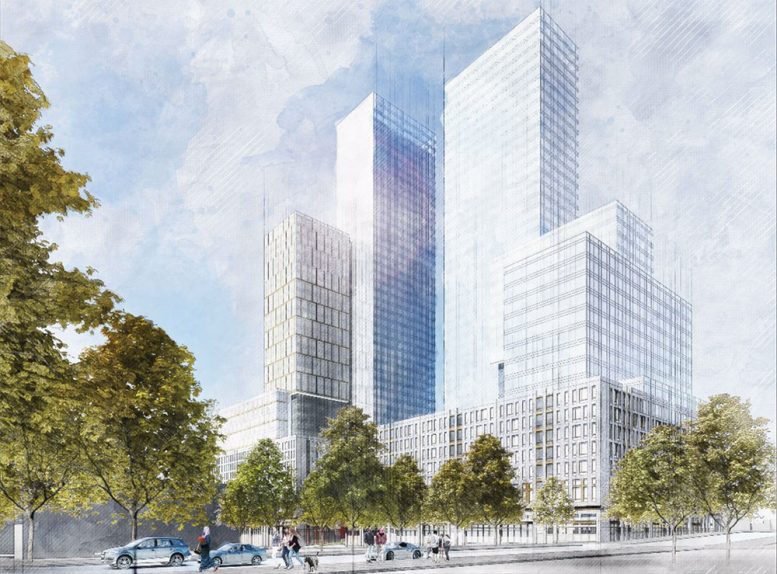A controversial housing development set to allow the building of two 39-story mixed use towers along Franklin Avenue at the site of the old Spice Factory is getting push back from a local Councilwoman.

Majority Leader Laurie Cumbo (D-Fort Greene, Clinton Hill, Crown Heights) yesterday gave testimony during a public scoping meeting on the 960 Franklin Avenue rezoning at the New York City Department of City Planning denouncing the proposed development project.
The controversial project would add nearly 1,600 units at Franklin Avenue lot between Montgomery Street and Sullivan Place, replacing the old Spice Factory. The two towers will be between 421 and 424 feet tall with 1,369,314 gross sq. ft of total space. There’s more than 21,000 GSF dedicated to retail space and 9,000 GSF for a community facility. Off-street parking spaces amount to 180, according to Bklyner.
“Whether it’s an 80-story tower on Flatbush Avenue or a private equity firm purchasing an entire portfolio of historic buildings in Bed-Stuy, real estate development pressure in my district seems to increase by the day, threatening to transform our neighborhoods into a cookie-cutter luxury product unrecognizable to longtime Brooklyn residents and familiar only to those living in Anytown, USA,” said Cumbo.
On Tuesday, Cumbo joined other local residents and community groups like the Brooklyn Botanic Garden (BBG) to oppose the project by developers the Continuum Group. BBG alongside Movement To Protect The People (MTOPP) and Flower Lovers Advocating for Communities (FLAC) came out and stated clearly their objection to the massive towers.
The coalition of critics instead requested developers incorporate additional environmental assessments, including how the project would impact bird migration, wind turbulence, sun glare, waste and possible tribal significance related to the Lenape, thought to once inhabit the area.
Additionally, BBG specifically claims the project will have an adverse effect on the Gardens due to the towers shadow .
Cumbo is also pushing back against the affordable housing units under the city’s Mandatory Inclusionary Housing (MIH) plan, claiming the affordable bands do not reflect the income of the neighborhood.
“Market-rate apartments are priced far above what most community residents can pay and sometimes even the so-called “affordable” housing has rents over $2,000 a month. And all of this new development has a cumulative impact, placing increasing stress on our infrastructure – our schools, our parks, our subways, our roads, our sewage lines, and everything else. The current pattern of real estate investment and development in Central Brooklyn is clearly not serving our existing communities in an inclusive and holistic way.
According to the most recent breakdown of units:
40% would accommodate families at or below 50% AMI (316 Units)
20% would accommodate families at or below 80% AMI (158 Units)
60% of all affordable units accommodating low-income families at or below 80% AMI (473 units, consistent with and exceeding the City’s MIH program options)
20% would accommodate families at or below 100% AMI (158 units of workforce housing)
20% would accommodate families at or below 120% AMI (158 units of workforce housing)
The development is a half-block away from Ebbets Field which has 1,300 units, across the street from the upcoming Spice Factory rezoning project that is building 390 apartments, and 111 Montgomery with 163 apartments, and a block away from 300-unit Tivoli Towers. Several speakers insisted on studying the “cumulative effect” which would include existing and upcoming development.
However, a spokesperson for the developer The Continuum Group, claim that the towers will not adversely affect the gardens based on a previous shadow study for Cornell Realty Management (the proposed residential development located directly north of 960 Franklin Avenue) that concluded the project would not result in significant adverse impacts as a result of new shadows cast on the Brooklyn Botanic Garden.
The developers are also already conducting a second analysis to ensure the future of the garden.
“A detailed shadows analysis is currently underway for the 960 Franklin Avenue project using the same methodology and guidance from the City Environmental Quality Review (CEQR) Technical Manual. Based on preliminary findings, no significant adverse shadows impacts are anticipated on the Brooklyn Botanic Garden. We look forward to reviewing our preliminary findings with the Brooklyn Botanic Garden,” said Lupe Todd-Medina, spokesperson for The Continuum Company.
The developers also claim that they are committed to ensuring affordable housing and union jobs for the local residents and community leaders.
“As proposed, 960 Franklin Avenue is a 50% income-targeted, 100% union-built residential development. As neighbors and partners in our community’s responsible development, we continue to look forward to sitting down with the leadership of the Brooklyn Botanic Garden. We also look forward to working with the community, local elected officials and community stakeholders to present Crown Heights with a union-built project that will provide much-needed income-targeting housing,” added Todd-Medina.






